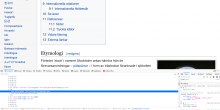Summary:
The "auto-number headings" option severely degrades performance for users who have it enabled and consumes cache capacity for little benefit. The value of the feature, when working as intended, also seems dubious. It is probably best to simply remove the option.
Context:
The "auto-number headings" controls whether section numbers are shown in section headings. The default behavior is to show numbering in the table of contents, but not in the actual section headings.
Problems:
Usually, the HTML generated by the wikitext parser is cached for later re-use. This is done because parsing is relatively slow - depending on the size and complexity of the page, it can take several seconds. However, when the "auto-number headings" option is used, this caching becomes ineffective: since very few people use the option, the chances for a "cache miss" are high (cache fragmentation).
In effect, users that have "auto-number headings" set to a non-standard value are much more likely to hit an uncached page, forcing them to wait until the page has been rendered for them, which may take several seconds depending on the size and complexity of the page. That appears a very high cost for rather little gain.
Usage:
An ad-hoc analysis among users of en.wikipedia.org who have edited in the last 30 days shows that about 0.4% of active editors have the "auto-number headings" option enabled.
Solution:
If there is no great demand for this feature, we should simply remove it. If the feature is to be kept, it should be implemented in CSS: the numbering would always be generated, but the browser would be instructed to not display them. Appropriate CSS rules for showing the numbers could easily be generated from the user settings on the fly. Numbering in ToC would remain.
One possible case for having section numbering would be for print: here the numbers may be useful to find a given section, based on the numbering presented in the table of contents. However, the current behavior is the opposite: for printing, the numbers are hidden from the table of contents as well.

